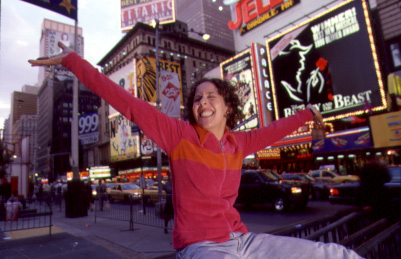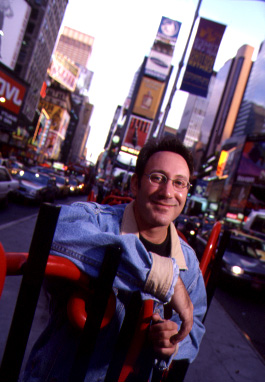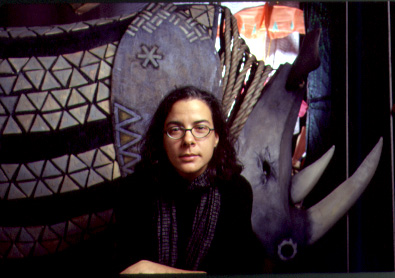
| SEARCH |
| YELLOW PAGES |
| WHITE PAGES |
| UVM HOME |



Act I - Ship of Dreams
Eight times a week, the “Ship of Dreams” wentdown at the Lunt-Fontanne
Theatre in New York City. And at every performance during the
first year of the run of Titanic, the 1997 Tony Award winning
musical, audiences shared the event with the passengers and crew
of the doomed luxury liner — among them, Mara Stephens ’91, who
made her Broadway debut in the role of Bellboy.
After college roles in Royall Tyler productions, Stephens arrived
in New York in 1991 and for the next five years took a variety
of off-Broadway roles. In early 1996, after appearing in the SoHo
Rep’s Obie Award winning production Wally’s Ghost, Stephens was
called for a musical workshop on the Titanic disaster. Noting
that she “did not consider myself a musical actor,” she cancelled
the audition. Four months after the first offer, another one came.
Still no interest. Then in December 1996, Stephens was asked to
audition for a specific role in the production. “When I got there,
I was a little surprised. I mean, the bellboy? He had one line:
‘Dinner seating for Thursday, April 11th is now being served in
the first class dining saloon,’ recalls Stephens in a British
accent. “It was all very exciting, though and they liked my dialect.”
She was cast.
As the show changed substantially during rehearsals, the Bellboy
came to appear in all of the ensemble numbers, ten scenes, more
lines, and, was given a name: Edward.
“The cast was fabulous — a great family. Each night we would go
through this experience together,” says Stephens. “One night,
the ship didn’t sink. That was a problem.” They had to refund
the house and ask everyone to come back for another show. The
sincerest form of flattery was paid to Stephens in the first year
of the run — Edward the Bellboy was parodied in the 1997 Forbidden
Broadway review and has become a permanent part of the show.
“I feel incredibly lucky that I am doing theater,” says Stephens,
who chose to leave Titanic after the first year. “I want to keep
challenging myself. Stay inspired and focused on the craft of
acting.”
ACT II -
Grease is the Word
 To an audience, every night is opening night. The first appearance
of the conductor, framed by a single spot, can set the tone for
the rest of the evening.
To an audience, every night is opening night. The first appearance
of the conductor, framed by a single spot, can set the tone for
the rest of the evening.
“I found myself trying to enjoy the experience while it was happening,”
says Steven Freeman of conducting the Broadway musical Grease
on opening night. Over a hundred other opportunities to conduct
would come along before the show closed its four-year run on Broadway.
But that night was memorable. It was the first.
“It is incredibly rewarding, but hard work to keep yourself fresh
and excited,” he says, admitting that actors and musicians have
to fight complacency. “Eight shows a week is hardly glamorous.
It’s more or less a job for the musicians, so you can pace yourself.
Actors face the grind. Not everyone has the stamina for a long
run.”
Freeman’s run started the first day he walked into UVM’s Royall
Tyler Theatre in 1974, a few months before the theatre opened.
“I was assistant music director of The Contrast,” he says. “I
recall the decision to rehearse the first number and I looked
around and realized that there wasn’t a music director; I was
it.” That first show, the rehearsals and the performance, convinced
Freeman that this was something he was destined to do.
Last summer Freeman worked on a revival of Irving Berlin’s Easter
Parade with Tommy Tune and Sandy Duncan. The schedule was exhausting:
10 – 6, six days a week — in preparation for a backer’s audition.
He continues to perform regularly with Duncan, her husband Don
Correia, and Guy Stroman in a Broadway review with symphony orchestras
around the country.
Freeman’s secret to a long run in the business? “Do the work.
Take the lessons. Learn about the business of show business. Sustain
yourself in theater through study and keep looking for the next
opportunity.”
ACT III - Hakuna Matata
Lion King: The Broadway Musical was born in New York, at the same
Broadway rehearsal facility as Titanic. For Michele Steckler ’86,
associate producer for the musical, memories of that birth resemble
pieces of a puzzle — a dance room; a puppet room; costume fittings;
production meetings; an amazing creative, collaborative energy
recalled with pleasure.
Steckler, whose office overlooks the heart of New York’s theater
district, has career credits that include stage managing more
than twenty productions all over the world.
In her sophomore year, Steckler decided her passion was not on
the stage, but in front of it. Stage managing The Shadowbox, led
to Hair. “There were no classes in stage managing. It was learn
by doing. I had people years later tell me about huge theater
departments or BFA programs where they weren’t able to do as much
hands-on.”
Following UVM, an internship with the American Repertory Theater
in Boston was a stepping stone to stage managing a European touring
company. Other tours would follow to Japan, Australia, throughout
the U.S. and Canada, in which Steckler worked with many of theater’s
top directors.
Collaboration is key in the theater, according to Steckler. “You
are forced to collaborate; to share and interact with people in
a very, very intense and close way. You learn to deal with people
who have different needs, and, you learn to help people fulfill
their individual goals.”
Admitting to working all the time, Steckler does like to travel
around a tour date and creates personal time when she can. She
is very close to her two sisters and parents. “My family unconditionally,
unilaterally supported me in anything that I have ever wanted
to do — which to me is the greatest gift one could ever get.”
Last summer, Michelle was off to Tokyo where, in late December
1998, Lion King opened to a new audience. For anyone who enjoys
the theater, Lion King is the ultimate gift. n
